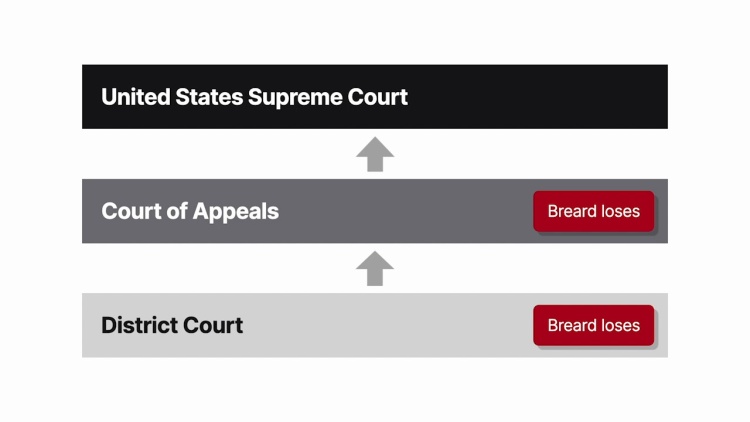Breard v. Greene
United States Supreme Court
523 U.S. 371 (1998)
- Written by Megan Petersen, JD
Facts
Angel Francisco Breard (plaintiff), a citizen of Paraguay, is a death row inmate accused and convicted in Virginia state court in 1992 of the attempted rape and capital murder of Ruth Dickie. In 1996, following his conviction, Breard filed a petition for an original writ of habeas corpus in federal district court. Breard alleged that his rights under the Vienna Convention on Consular Relations (Vienna Convention) were violated at the time of his arrest when the arresting authorities failed to inform him that, as a foreign national, he had the right to contact the Paraguayan Consulate. The district court dismissed this claim on the ground that Breard procedurally defaulted when he failed to raise the claim at the state court level. Additionally, the district court held that Breard could not demonstrate cause and prejudice for his default. This decision was affirmed on appeal, and Breard petitioned the United States Supreme Court for a writ of certiorari. Also in 1996, the Republic of Paraguay, the Ambassador of Paraguay, and the Consul General of Paraguay to the United States (collectively Paraguay) brought suit in district court against certain Virginia state officials, alleging that their separate rights under the Vienna Convention were violated by Virginia’s failure to inform Beard of his rights under the treaty and to inform the Paraguayan Consulate of Breard’s arrest, conviction, and sentence. Additionally, the Consul General brought a parallel claim under 42 U.S.C. § 1983, alleging a denial of his rights under the Vienna Convention. The district court held that it lacked subject matter jurisdiction to consider these suits because Paraguay was not alleging a “continuing violation of federal law.” Thus, the district court held Paraguay had neither Vienna Convention nor Eleventh Amendment grounds to bring its suit. Paraguay also petitioned the United States Supreme Court for a writ of certiorari. On April 3, 1998, Paraguay instituted proceedings against the United States in the International Court of Justice (ICJ), alleging the United States violated the Vienna Convention at the time of Breard’s arrest. Six days later, the ICJ noted its jurisdiction and issued an order requesting that the United States take all measures possible to avoid executing Breard pending the ICJ’s final decision in these proceedings.
Rule of Law
Issue
Holding and Reasoning (Per Curiam)
What to do next…
Here's why 907,000 law students have relied on our case briefs:
- Written by law professors and practitioners, not other law students. 47,100 briefs, keyed to 996 casebooks. Top-notch customer support.
- The right amount of information, includes the facts, issues, rule of law, holding and reasoning, and any concurrences and dissents.
- Access in your classes, works on your mobile and tablet. Massive library of related video lessons and high quality multiple-choice questions.
- Easy to use, uniform format for every case brief. Written in plain English, not in legalese. Our briefs summarize and simplify; they don’t just repeat the court’s language.





